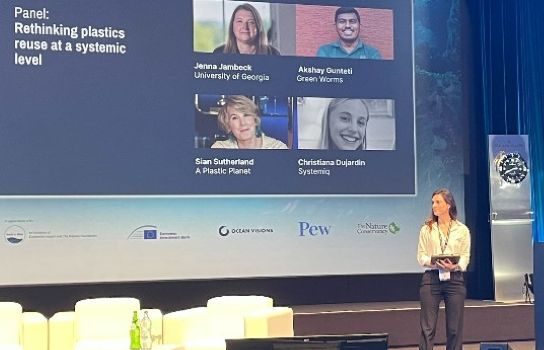The eleventh annual World Ocean Summit returned to Lisbon, Portugal, in March.
The summit convenes a broad cross-section of the ocean community, from business and finance to government, policymakers, civil society, and academia; and is designed to inspire action to meet the 2030 targets in UN SDG 14: conserve and sustainably use the oceans, seas and marine resources.
Zinnie Cowing, Researcher at Common Seas, reflects on her time during day one of the summit.
Reuse as a focus of the World Ocean Summit
The inaugural day of the World Ocean Summit featured the ‘plastics track’, a group of panel discussions on the topic of plastics, chaired by our very own Carla Worth, Policy Lead at Common Seas.
The plastic track encompassed four panel discussions addressing the various stages of the plastic lifecycle, from reducing plastic production, to rethinking plastics reuse at a systemic level, through to transforming waste-management and recycling processes. The discussions highlighted the complexity of tackling the plastic pollution crisis and emphasised the importance of ensuring that the Global Plastics Treaty encompasses solutions that target the full lifecycle of plastics.
A standout moment for me was the panel on systemic reuse. It was amazing to see the energy and shared commitment in the room towards turning reuse into a practical reality. Collaborating closely with small island states, Common Seas promotes island-wide systemic reuse initiatives fostering sustainable practices and advocating for ocean conservation. The insights shared during the panel resonated deeply with our efforts in co-developing effective reuse strategies with our government partners.
The all-star panel included: Jenna Jambeck, regent’s professor, New Materials Institute, Circularity Informatics Lab, College of Engineering, University of Georgia, Akshay Gunteti, Director of circular economy partnerships, Green Worms and Sian Southerland, co-founder, A Plastic Planet. They discussed common myths around reuse, and furthered that these perceptions are outdated and false, and, importantly, are only serving to block innovation and scalability in reuse systems, which has been identified as critical for reducing plastic pollution.
The panellists together debunked several prevalent misconceptions surrounding reuse, including:
Will standardised design kill brand recognition?
Standardised designs, which are typically required to deploy reuse systems at scale, don’t necessarily kill brand recognition. Brands have proven themselves to be remarkably adept at differentiating themselves through other means.
This includes via quality assurance and customer experience, such as through reward systems for customers who return reusable packaging. Moreover, brands can benefit from the positive association with sustainability efforts associated with reuse systems, thereby reinforcing their identity by aligning with consumer values and showcasing their commitment to sustainability.
Will reducing plastic production shut down the economy?
While reducing plastic production may lead to adjustments in certain sectors, such as packaging, it also opens up new economic opportunities through innovative solutions like washing, returning, and reuse systems, which can create jobs and stimulate growth in the circular economy.
Is reuse more expensive than single-use?
Contrary to popular belief, reuse can actually be more cost-effective than single-use alternatives when considering the entire lifecycle of a product and when implemented at scale. Although initial investments may be higher, the long-term savings from reduced raw material consumption and waste management can outweigh these costs, making reuse a financially viable option in many cases.
Panel discussions and audience questions also shed light on the need for greater inclusivity and equity within reuse systems. It was emphasized that these systems predominantly operate in large urban centres of developed countries, leaving out many remote and small-island communities who may be ideally positioned to use them.
Furthermore, despite growing support for reuse highlighted in the Global Plastics Treaty negotiations— the revised draft text for the treaty mentions reuse 42 times—there remains widespread confusion regarding the definition and implementation of reuse. This underscores the ongoing challenge of clarifying and standardising reuse practices to effectively combat plastic pollution.
To that end, we are thrilled to announce our participation at an upcoming INC-4 side-event hosted by the Global Plastic Policy Centre on Sunday, April 21st, 2024, in Ottawa, entitled ‘Demystifying Reuse’. This session will invite INC-4 attendees to join a participatory, challenge-based discussion on the topic of reuse. The focus will centre on exploring reuse solutions for Small Island Developing States (SIDS) and low-income countries and ensuring a just transition in reuse practices. The primary objective of this event is to collectively envision a Treaty that champions the adoption of high-quality, inclusive and impactful reuse systems, drawing from the invaluable lived experiences of stakeholders.
We hope to see many of you there sharing your own first-hand experiences with reuse systems. Let’s come together to pave the way for a more circular, plastic-pollution free future!

